- Home
- Jacob Peppers
A Warrior's Burden: Book One of Saga of the Known Lands Page 7
A Warrior's Burden: Book One of Saga of the Known Lands Read online
Page 7
The boy turned back to him and hesitated, perhaps deciding if dying was the better course. Certainly, it was the easier, for to live, Cutter knew, was to feel pain. In the end, though, the boy only nodded, saying nothing.
Cutter understood that too. After all, the world being what it was, what could a man say? What answer could he give? He could do nothing but walk the path before him. “Come,” he said, “this way.”
The air felt thick around them, oppressive, and each step Cutter took felt as if it was in the face of a high wind, one that pressed against him, trying to eject this trespasser from a place in which he did not belong. The forest around them was silent, too, far more silent than any wood he’d ever been in before, but he knew that that silence—like so much else in the Black Woods and having to do with the Fey at all, in fact—was no more than an illusion, just as the feeling that they were alone was an illusion. He did not doubt that even now, their progress was being marked, that it had been marked since they’d first set foot in the wood.
But like a dream, knowing a thing was an illusion did not mean that a man could peer behind the curtain, that he could see exactly what—and who—it hid. So, he did the only thing he could do: he walked on, checking behind him from time to time to see the boy with his shoulders hunched, his head tucked down against the frigid wind that whistled through the trees. He knew they could not go much farther. The temperature had grown colder still, seemed to drop a degree for each step they took into the forest, and the boy would not survive much longer. Neither would he, for that matter, but he had long since come to grips with his own impending death, and it was not for himself that he still lingered.
The boy, though, had barely lived and was too young to face death. That was not the only reason why he wished him to live, but it was the only reason he was prepared to be honest with himself about. The other brought back too many memories, and memories brought back too much pain. It was enough that he would keep the boy alive, if he could. He knew what he was, knew that he was not the man to save children from monsters lurking under their beds or in their closets. Knew, in fact, that he was the monster. But while all monsters had their fangs, their claws, there was nothing that said they could not use those on other monsters.
He knew what he was—had known for over fifteen years, was haunted by the memory of that knowledge, the memory of his greatest crime. Better for everyone, perhaps, if he was dead, but he would not die yet, not until the boy was safe, though what that meant, the world being what it was, he had no idea.
He heard a shuffling sound behind him, a breathless gasp, and turned to see that the boy had fallen. “I-I can’t,” the youth gasped, his breath pluming in great clouds as he sat on his hands and knees, his head hanging low. “I can’t.”
Cutter could have lifted him—he’d lifted heavier, that was sure, and scraping out an existence in the wilderness, even in a town like Brighton, didn’t leave a man, or a boy, a lot of fat on him—but he knew that doing so would not be a favor. Instead, he stopped, frowning. “What do you intend to do, then?”
The boy raised his head, panting. “What?”
“You said you can’t go on. So I’m asking you—what do you intend to do? Will you lie there and die? Will you weep and moan like some whipped mongrel?”
The boy’s face twisted with grief, and for a moment, it looked as if he might cry, then his eyes flashed with anger, and it was a battle between the two to see which would win out. Cutter watched, curious, his blank stare doing nothing to reveal just how invested he was in the outcome. In the end, the boy chose anger as he had hoped he would. “Burn you,” he hissed. “You’re a bastard.”
“Yes. I’m a bastard, the air is cold, and you’re lying there whining about it.”
The boy let out a growl then rose to his feet with a strength he hadn’t looked to possess a moment before, drawing a small knife, the kind used for gutting small game, from his belt as he did. He tensed, as if he would come at Cutter, as if he meant to kill him, and Cutter waited, wondering whether or not he’d let him. In the end, though, the boy only slid the knife back into its sheath and stared at him, his face red with fury. “I hate you.”
“You’re not the first. You’re angry now, and that’s good—I can handle anger. The world bein’ what it is, I don’t understand a man who isn’t. Better that, better you hate me, than I have to listen to you whine and mope anymore. Now, are you finished? The storm’s going to get a lot worse before it gets better, and if we spend much more time out here, we won’t come out the other end of it.”
The boy’s mouth worked, thinking over some biting remarks to say, maybe, but in the end, he only nodded. “I’m ready.”
“Good. Now, come on.”
***
As they walked, Cutter glanced around them, surveying the trees, their trunks far thicker around than any normal tree. Oddly, while there was snow covering the ground here as it had on the plain, none of it stuck to the trees, as if even the precipitation itself sensed the wrongness that seemed to emanate from them.
And emanate it did. Cutter was not a man known for his feelings or his sensitivity, but even he could feel the wrongness here, could feel it like pinpricks on his skin, taste it like ash in his mouth and smoke in his throat. It had been the same the last time, that feeling, of being watched, yes, but of being hated, too. Hated by the very trees which loomed overhead, by their roots, deep and old which snaked through the ground beneath their feet, like great veins pumping the blood in the heart of some malevolent beast.
“How about…there?”
The boy’s voice cut through the stillness, seeming somehow profane or perverse, but Cutter turned, following his pointing finger to a ledge of ground underneath which was a very large hole, as if one of the massive trees surrounding them had been uprooted long ago. Cutter scorned himself for not having noticed it, for allowing himself to be so distracted by his own thoughts, by his surroundings, to even notice. It was important, he knew, for a man to keep his wits about him in the Black Woods. He had seen several companions who had not, who had allowed themselves to become distracted just as he had and who had paid for it with their lives.
“That will do nicely,” he said. “Good eye, boy.”
He saw the boy smile as if pleased at the compliment, but he chose to ignore it, walking toward the cut out. They made it there a few minutes later, and upon closer inspection it turned out to be much smaller than it had first appeared. The boy hesitated, glancing at him, obviously wanting to take the spot first but not wanting to be impolite. Cutter wanted to tell him that there were far worse things than being impolite, freezing to death for one, but there were more important things that had to be done before they slept, so he only nodded his head. “Take it, boy.”
“But…but what about you?”
“What about me?” Cutter growled. “You gotta learn, boy, to look after yourself and no one else. The world doesn’t give a shit about you or anyone. The best you can hope to do is survive.”
The boy clearly wanted the spot, but still he hesitated. “My mother said that an act of kindness comes back to a man as ten down the road.”
“And if he’s dead down the road, by the time the kindness makes its way back? Just take the spot, boy. You’re shakin’ like a leaf already. That’s bad, but when the shakin’ stops, that’ll be a whole lot worse.”
“B-but I can help you to build a fire.”
“A fire? Here, in the heart of Fey power? No, boy. It wouldn’t catch, believe me, and if by some unlucky miracle it did, we wouldn’t get to enjoy it long. There are powers in this wood, lad, many kinds, some very old and some not easily stirred. But lighting a fire here, in this place, would stir them sure enough. Now, here. Lay out your bedroll and get some sleep. We won’t be goin’ anywhere until the storm passes.”
“But what about the men?”
“If they come for us now, in this, they’ll die the same as us if we try to go on any farther. Relax. You’re safe.”
“Safe,” the boy said as if it was a word he had not heard before, one to which he did not know the meaning, then he blinked groggily and began laying out his bedroll. He started to lie down, but Cutter caught his arm.
“Not yet. There’s a few things we need to talk about first.”
“Like what?” the boy asked, his voice sounding slurred.
“There are things here, in these woods,” Cutter said. “Probably you can feel that, have felt it since we came here. True?”
The boy nodded. “Yes. It…my skin itches. And there’s…I feel something, like someone’s looking at me or watching me or…”
“That’s because they are,” Cutter said. “Make no mistake, boy. You might not see them, but they’re there, and they know that we’re here.”
“But…what can we do? What do we do if they come?”
Die probably. But that wasn’t the sort of medicine the boy needed now, so he lied. “They won’t come. You’re safe, boy. Lie down and get your rest while you can. Once the storm passes, we’ll have to head out. We won’t go too deep into the forest; the deeper in you go the more dangerous it gets, the oldest, greatest dangers lying at its center, but we have to go deep enough to lose the men that will be coming. Anyway, what I need you to understand is that you might hear things, during the night. Might see things. Ignore them. Whatever else you do, ignore them. Do you understand?”
“They’re not real, you mean? Just…magic?”
“No, boy,” Cutter said. “They’re real, alright. The Fey may love their illusions and their tricks, but they are real, and if you let them, they’ll show you just how real. Do you understand me?”
The boy nodded, his eyes drowsing as he moved toward his bedroll, but Cutter caught his arm again. “Tell me you understand. If you hear anything, if you see anything, tell me you’ll ignore it.”
“I understand,” the boy said angrily, pulling his arm away. Cutter let him and watched as he lay down to close his eyes.
He had told him. Just as him and his companions had once been told and like those companions, like himself, the boy said he understood. The problem, though, was that some of those men who had said they understood vanished during that first night in the Woods, vanished and never came back again. At least, not all of them. Sometimes, during the days that followed, he or one of the others would stumble on little pieces of them, left like grisly trophies or prizes in their path. A finger, a toe, a tongue, an eye. The Fey were creative bastards, if nothing else.
Those were old memories, ones associated with others which he had spent years trying to forget and, recalling them as he now did, he decided that he would have to stay awake, no matter that he had gotten little sleep over the last three days, and that he was exhausted. He would stay awake as best he could to look out for the boy, to make sure that nothing happened to him. He sat with his back against a nearby tree, determined to stay awake, for it was the only way to make sure that the boy was alright.
He was asleep in less than five minutes.
CHAPTER TEN
What are the Fey, you ask?
That is not a question easily answered, for you see, they are many things.
They are beautiful and ugly, they are kind and cruel, they are clever and foolish.
They are like men, then, and, like men, one thing, above all else, might be said of them—
Whatever else they are, they are deadly.
—Exiled Historian to the Crown Petran Quinn
Matt dreamed of fire. Fire and blood and smoke rising in great, dark churning pillars all around him. He dreamed of the sound of metal striking flesh. And the screams, of course. At first, he had no idea where he was, some hellish inferno where the attackers screeched like demons, swooping in on the villagers who ran and cried and begged. But no matter what they did, the men came for them, the sword came for them, and the answer to their pleas, to their cries of “Why? Why?” was always the same—blood.
All of it taking place around him but none of it touching him, so that he felt like a man who had bought a ticket to some demented show. And looking around, he began to see things he recognized. There, on the wall of a half-burned home, was a deep groove in the stone where he remembered himself and some friends trying to carve their initials but giving it up after seeing how long it would take. On his left, he could see the village’s single well, one his father, before he’d died, had helped repair and maintain. Countless other small, trivial things, enough to let him know where exactly he was, and that knowledge immediately brought regret.
Better to not know, better to think he had been cast headlong into some violent, terrible city of the damned and that those poor souls who suffered and died were strangers than to know them by name, to know the village—or what was left of it—by name. Better to be dead, he thought, than to witness Brighton burn.
He ran then, with no idea where he was going, only meaning to go away, to get away as quickly as possible, but his feet refused this simple command and, in time, he was standing twenty feet away from his own home, the home he had lived in his entire life. Standing there, looking at it—or, at least, what was left of it—fear gripped his heart in an icy fist. The door had been stoved in, but, perhaps kindly, the inside of the house was obscured by thick, roiling clouds of smoke and shattered debris. Was his mother in there somewhere? Was she lying in bed, weak and feeble as she had for the last year? If he walked inside, would she smile at him, the smile that lately seemed to cost so much? Or was she dead already? If he walked inside, would he find her body lying there, mutilated as the villagers’ had been? Broken and cast aside, the best thing in his world—perhaps the only really good thing—destroyed by the village’s attackers with no more thought than a man might give to swatting a mosquito?
He thought that maybe he would, was terrified that he would, and he decided he did not want to go into that house, dared not go. But again, his feet betrayed him, acting of their own accord, and the next thing he knew he found himself slowly walking toward the broken, burned shell that had once been his home but was that no longer. Walking and moaning at the same time, “No, no, please gods no,” over and over in a litany that offered no comfort, in a plea that went unanswered.
He thought that things could get no worse, was sinking into a pit of despair, one from which he thought he would never emerge, one from which he thought he would never want to.
Then he heard the voice.
A child’s voice, a girl’s by the sound, screaming for help. Not so uncommon, not in that hellish place, for there were many screams, many pleas, but somehow this one was clearer than the rest, cutting through the din the way the brutal winter winds sometimes whistled through the village, sounding almost alive. Or at least had whistled, for they would whistle through Brighton no more, and anyone happening by a week from now would find no more than the broken remnants of a place where people had once been born and lived their lives. Any such traveler, a year hence, might wonder what had happened to this place, might wonder at its name, but that name, along with the lives of those who had once lived there, would be lost to time, covered in it the way shrubs and stones might lie covered deep beneath a winter snowfall.
“Please, help me,” the voice called again, and finally Matt seemed to regain some semblance of control over his own body. He turned in the direction from which the voice had come, grateful for any reason, any means of avoiding what lay in his home, of what he might find there. He feared for a moment that his feet would turn back to the house again, but they did not, and soon he was walking, rushing past villager and attacker alike, all of whom ignored him, as he made his way toward that voice.
He climbed out of the cutout from where the great tree had fallen. Cutter, sat with his back propped against the trunk of a great tree, his eyes on the cutout and on Matt. Or, at least, they would have been had the man not been sleeping, his head sunk low on his chest. Even asleep, Matt was surprised by how intimidating the man seemed. That menace was not lessened by the fact that he was covered in
snow and frost, frost which clung to his dark beard, his eyebrows and eyelashes, but was somehow instead enhanced by it. He was like some ancient warrior frozen in time but waiting for a moment when he would be woken once more to reap a bloody harvest.
The chill that went through Matt’s spine at that thought wasn’t just from the cold. He had once thought this man his friend, the quiet man who lived up the hill, rarely speaking but, when he did, always seeming to say something of value. Gruff, sure, blunt and little concerned with politeness, but possessed of a deep, abiding kindness beneath all that, beneath that cold, blue stare so pale as to be almost gray. Now, having seen him in the last few days, how he moved through the snow relentlessly, as if a blizzard was just a challenge, one which he would inevitably overcome, after having seen how easily he had left those people in Brighton to fend for themselves against their attackers, now Matt was not so sure.
After all, whatever the man had told him, he believed that he could have helped. He didn’t know what exactly Cutter was, had no idea who he had been before he’d come to Brighton, apparently carrying with him Matt, a baby then, but he knew that the man was not a normal man, at least not in the way that his father—or the man who had claimed to be his father—had been a normal man. He could not imagine Cutter bouncing him on his back and playing “horsey” as his father had, could not picture him sitting at dinner with his family, laughing and telling jokes.
He pictured him, instead, for reasons he did not know, standing on a slight rise in the middle of a great field, a field in which lay thousands of countless dead. And he, Cutter, the only one standing. He pictured him holding some great, massive weapon, a sword, perhaps, or a club. No, that wasn’t it. He pictured him with an axe, a great, double-bladed axe with a haft so thick and a blade so heavy most men wouldn’t have been able to lift it. A black-handled axe with a black blade. He pictured him lifting the axe above his head easily in one hand, tilting his head back and roaring in mad glee as the blade dripped crimson drops onto the ground.

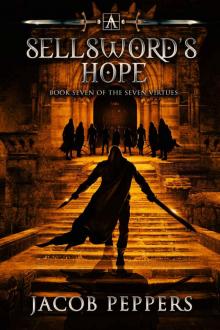 A Sellsword's Hope
A Sellsword's Hope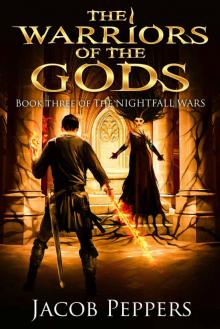 The Warriors of the Gods
The Warriors of the Gods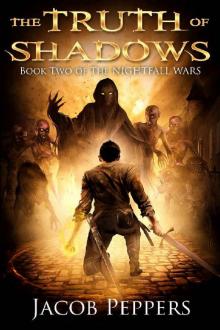 The Truth of Shadows
The Truth of Shadows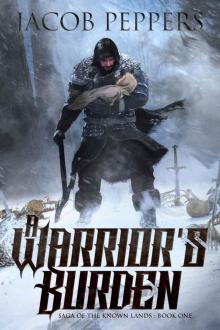 A Warrior's Burden: Book One of Saga of the Known Lands
A Warrior's Burden: Book One of Saga of the Known Lands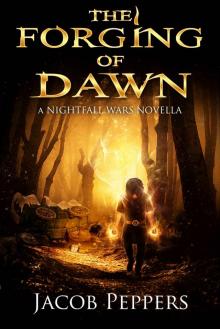 The Forging of Dawn
The Forging of Dawn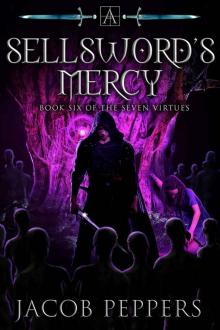 A Sellsword's Mercy
A Sellsword's Mercy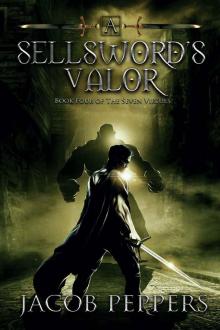 A Sellsword's Valor
A Sellsword's Valor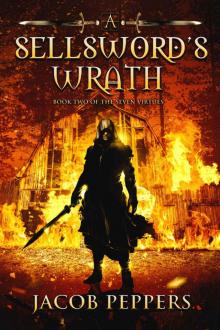 A Sellsword's Wrath
A Sellsword's Wrath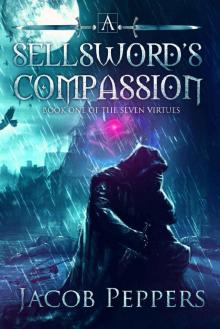 A Sellsword's Compassion_Book One of the Seven Virtues
A Sellsword's Compassion_Book One of the Seven Virtues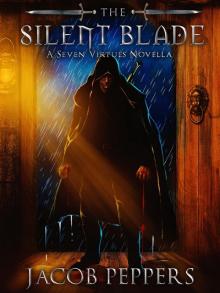 The Silent Blade: A Seven Virtues Novella
The Silent Blade: A Seven Virtues Novella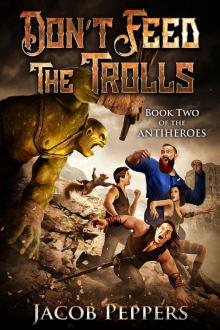 Don't Feed the Trolls
Don't Feed the Trolls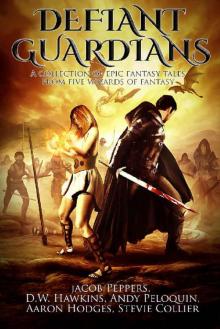 Defiant Guardians Anthology
Defiant Guardians Anthology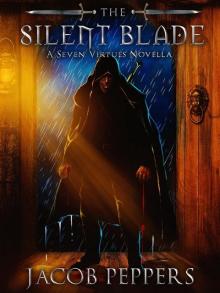 The Silent Blade
The Silent Blade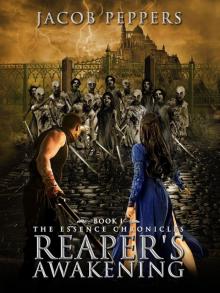 Reaper's Awakening
Reaper's Awakening